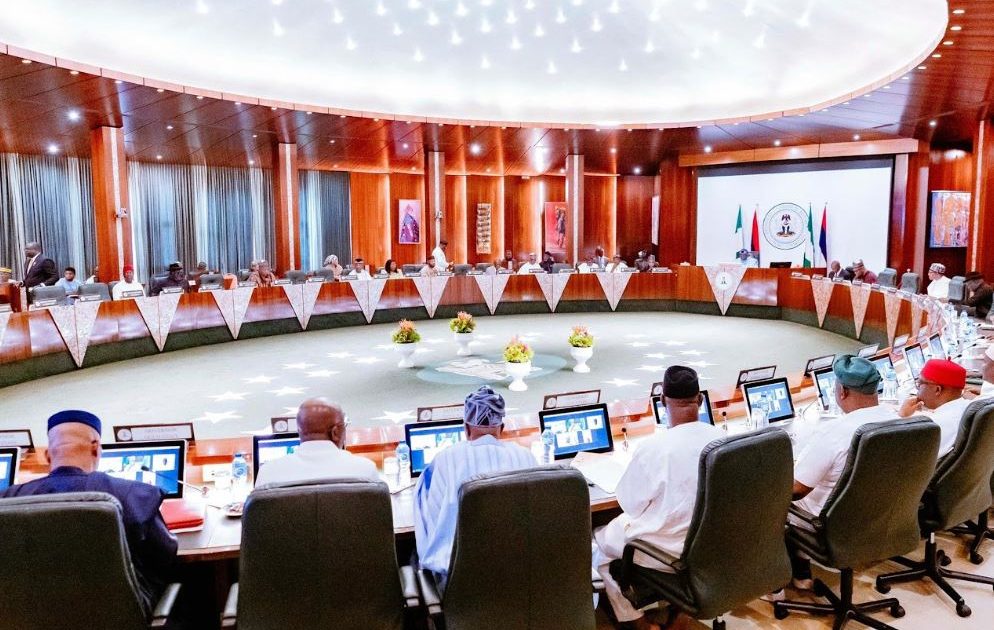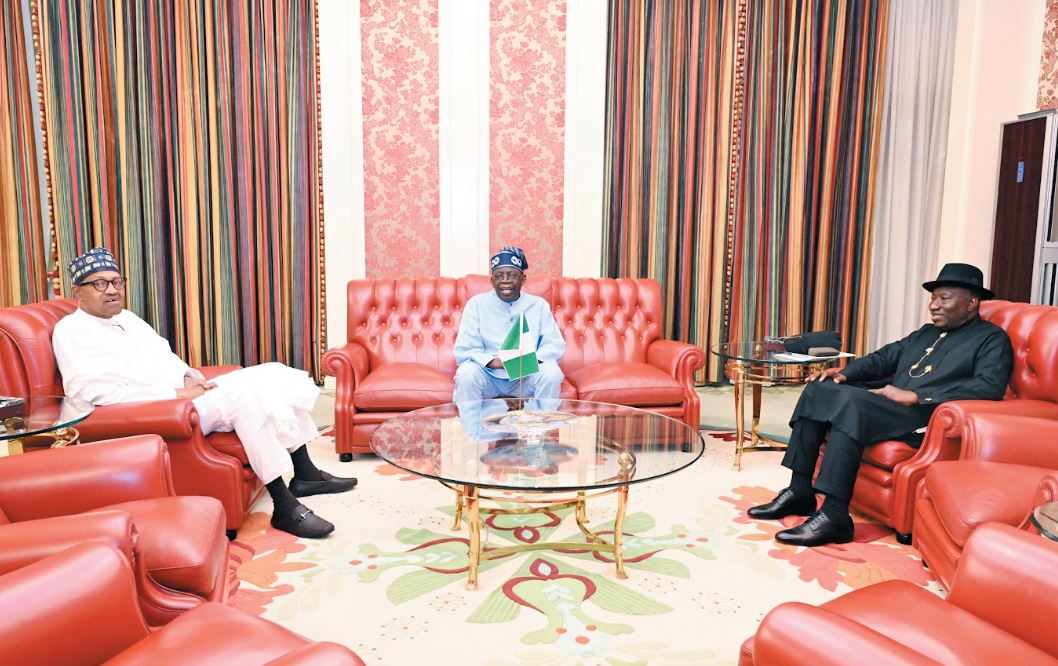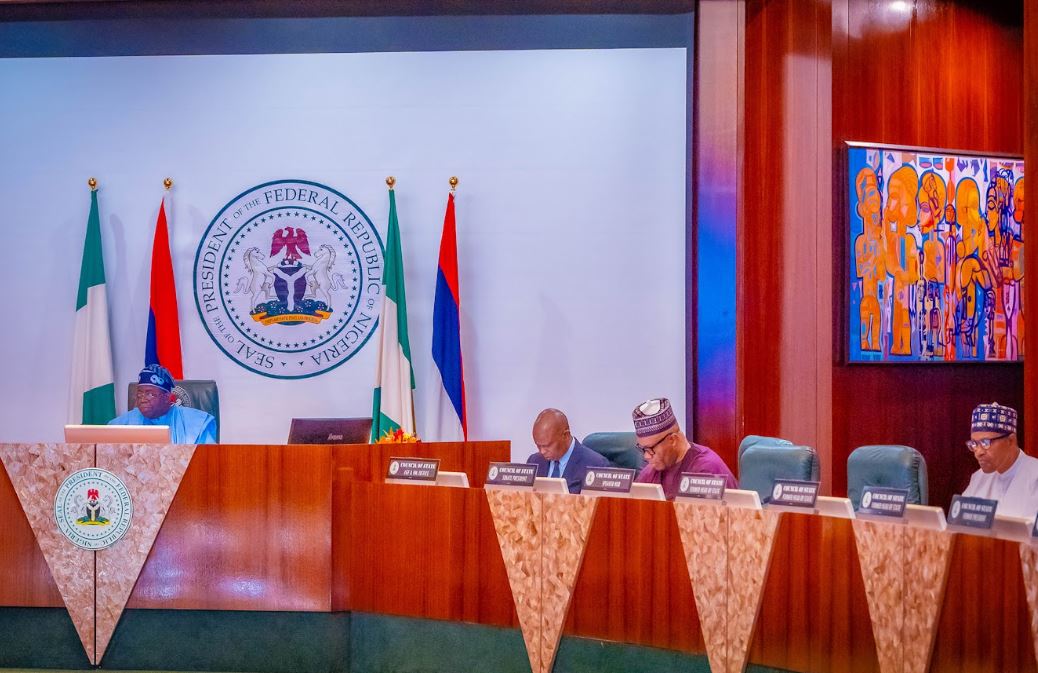
A total of N83 billion in cryptocurrency and fiat money has been identified by the Federal Government as having been channeled into the recent nationwide protests, according to a report by NewsNow. The funds include $50 million in cryptocurrency, with $38 million of this amount being blocked from four cryptocurrency wallets. Additionally, N4 billion was contributed by various political figures in Abuja, Kano, Kaduna, and Katsina.
These revelations were made during a presentation by the National Security Adviser, Nuhu Ribadu, at the inaugural meeting of the Council of State convened by President Bola Tinubu at the Aso Rock Villa in Abuja.
According to sources familiar with the proceedings of the meeting, Ribadu discussed the topic ‘The Nationwide Protest As It Affects National Security’ and disclosed that a European individual has been identified as the mastermind behind the dissemination of foreign flags during the protests and will soon be declared wanted by the Police.
On condition of anonymity, one source revealed that local collaborators in Abuja, Kaduna, and Kano have already been apprehended as part of the investigation.
“The NSA, in his presentation, mentioned that the government was able to trace $50 million to crypto wallets that were used for donations to the protests. They successfully blocked four of these wallets containing $38 million.
“It was also discovered that various political figures contributed N4 billion to finance the protests,” shared another source with NewsNow.
As previously reported by NewsNow, President Tinubu called for the Council of State meeting to address several issues, including the recent #EndBadGovernance protests, national security, the economy, and food security.
The Council includes the President (as chairman), the Vice President, former Presidents and Heads of State, former Chief Justices of Nigeria, the Senate President, the Speaker of the House of Representatives, the Attorney-General of the Federation, the Secretary to the Government of The Federation, and all state governors.
Former Presidents Goodluck Jonathan and Muhamamdu Buhari, along with former Heads of State General Yakubu Gowon (retd.) and General Abdulsalami Abubakar (retd.), participated in the inaugural Council meeting, joined virtually by governors from Abia, Adamawa, and Akwa Ibom State.

Obasanjo, IBB absent
Notably, former President Olusegun Obasanjo and former Head of State General Ibrahim Babangida (retd.) were absent from the meeting.
These developments unfolded shortly after Nigerian citizens, mainly youths, took to the streets of Abuja for a one-million-man march, which concluded with a relatively low turnout. The march marked the 10th day of the nationwide protest against the increasing cost of living in the country.
The protests, which began on August 1, escalated into property destruction and loss of lives, particularly in the Northern region, resulting in at least 17 reported deaths during the “days of rage.”
By August 3, just two days into the protests, viral footage showed protesters in Kano State waving flags and chanting in Hausa, “We don’t want bad government.”
In Kaduna, demonstrators were seen waving the Russian flag and chanting, “Welcome, Russia; Welcome, Russia.” This action raised concerns as Russia has been linked to unconstitutional regime changes in various West African countries.
The Nigerian military labeled the use of Russian flags during the protests as a treasonable offense and pledged to take strict action after investigating the individuals behind it.
In an address to the nation on August 4, President Tinubu cautioned demonstrators against being manipulated to support an unconstitutional agenda detrimental to democracy.
Reports from NewsNow had previously identified four politicians from Katsina, Kaduna, and Kano states, accused of promoting the use of the Russian flag among protesters to incite unconstitutional regime change.
Another insider at the Council of State meeting revealed that these local figures have been arrested, while the foreign mastermind remains at large.

According to the source, “The NSA also informed the Council about potential foreign interference in the protests, revealing that some foreigners played a role in fueling the demonstrations, indicating that it was not solely a Nigerian-led protest against the economic challenges.
“It was discovered that a foreign individual had connections to the protests and will soon be sought by the Police. The official announcement is expected to be made later this week.
“This individual is a person of interest, with Nigerian collaborators; a considerable number of whom have been apprehended. The search for the main suspect is ongoing. The NSA also confirmed that eight casualties occurred during the protests.”
In contrast, the Minister of Solid Minerals Development, Mr. Dele Alake, emphasized that no political entity would be permitted to instigate an unconstitutional regime change. He portrayed the #EndBadGovernance protests as an endeavor to achieve regime change, insisting that any such modifications must be pursued through legitimate electoral processes, not through insurgency.
“Any alteration in governance must adhere to electoral norms and should not be orchestrated by force, insurgency, or any other unconstitutional methods,” stated Alake during his briefing to State House correspondents following the Council of State meeting at the Villa on Tuesday.
During the recent briefing, the NSA discussed the security situation surrounding the country, emphasizing the events leading up to, during, and after the protests. He characterized the incidents as more than just protests, referring to them as attempts to forcefully bring about a change in regime which faced resistance.
The Council of State expressed gratitude to the Nigerian populace for opposing any unconstitutional moves aimed at altering the government. They encouraged dissatisfied individuals to wait for upcoming elections to express their views through voting.
The NSA reassured the Council about the robust security measures in place nationwide, affirming that no attempts to disrupt the established democracy would be tolerated. He underscored the commitment of all security agencies to uphold Nigeria’s territorial integrity and safeguard its democratic principles.
A cabinet member confirmed reports that he and colleagues from various ministries briefed the Council on several key areas, including the impact of nationwide protests on national security, economic conditions, food security, developments in the solid minerals sector, and plans for sustainable development.
Ministers presented progress reports, challenges, and future prospects in their respective ministries. The Finance Minister highlighted positive trends in the economy, including a steady reduction in inflation rates and favorable balances in trade and current accounts.
Finance Minister Wale Edun shared an optimistic outlook on Nigeria’s economic growth and societal progress, pointing out the potential for expansion in non-oil exports and the promising future of the service sector, particularly the outsourcing industry.
During the meeting, the Nigeria Governors’ Forum passed a vote of confidence in President Tinubu, demonstrating unanimous support from members. The Chairman of the Forum commended the presentation by the Federal Executive Council members and expressed satisfaction with the discussions held with the President.
The Council of State, which had not convened in 18 months, serves as a vital advisory body to the government on policy-making and decision-making processes, particularly on matters related to national security, appointments, and economic policies.
This constitutional organ advises the President on critical issues such as national security, economic challenges, and appointments of key officials like the chairpersons of electoral and population commissions. While the Council’s recommendations are not binding, they often influence presidential decisions during challenging times that require input from experienced leaders.
